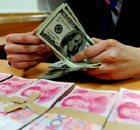Speeches & Activities
China not to blame for drought along Mekong: Thailand
By Zhang Jin (China Daily)
Updated: 2010-04-09 07:50
 |
Large Medium Small |
Upstream is where I live,
downstream is where you dwell;
Boundless love is what we have,
life on the river is what we share.
More than five decades ago, Chen Yi, then the Chinese foreign minister, composed the poem to describe the geographic and emotional proximity between China and Thailand.
On Thursday, Suwit Khunkitti, Thailand's minister of natural resources and environment, refashioned these lines to highlight the significance of joint efforts in dealing with the drought along the Mekong River.
Beijing is not to blame for the drought affecting areas along the world's sixth-longest river, which runs through Southwest China, Laos, Myanmar, Thailand, Cambodia and Vietnam, he said.
Eight dams built or being built on the upper reaches of the 4,880-km river, known as Lancangjiang River in China, only collected 4 percent of the river's water, a "very small amount" that cannot cause the drought, the minister said.
"It is all about drought itself and has nothing to do with dams," he said.
Some Southeast Asian media attributed the worst drought in a century to hydro projects in China because information was not available during the early days of the drought, he said.
Two weeks ago, China started to release water information regularly and the misunderstanding has been cleared.
The drought has left 24.25 million people and 15.84 million farm animals short of water in China, Liu Ning, vice-minister of water resources, said earlier this week.
A statement by the Mekong River Commission last month said the decline in the water level of the river was caused by the early end to the rainy season in 2009 and low monsoon rainfall. The commission groups Cambodia, Laos, Thailand and Vietnam, while China and Myanmar are dialogue partners.
But Suwit said the drought sounded an alarm and showed that concerted efforts are needed to address climate change.
Chinese Vice-Foreign Minister Song Tao has said that China will strengthen cooperation with downstream Mekong River countries to fight the drought, share hydrological information and techniques, and promote exchanges of experts, Xinhua News Agency has reported. He made the pledge at the Mekong River Commission Summit held in Hua Hin, Thailand, on Sunday.
Suwit said he is glad to see cooperation has already started, with Thai and Chinese companies establishing joint ventures to build dams along the river.
Suwit said he appreciated China's efforts in cutting greenhouse gas emissions and called on developing countries to team up to have a bigger say in climate change talks.
The minister urged rich countries to provide financial and technological support to developing countries, adding that the two groups of nations must assume differentiated responsibilities.
He also stressed that emission reduction efforts should not affect the economic growth of developing countries.
Wang Chenyan contributed to the story.











